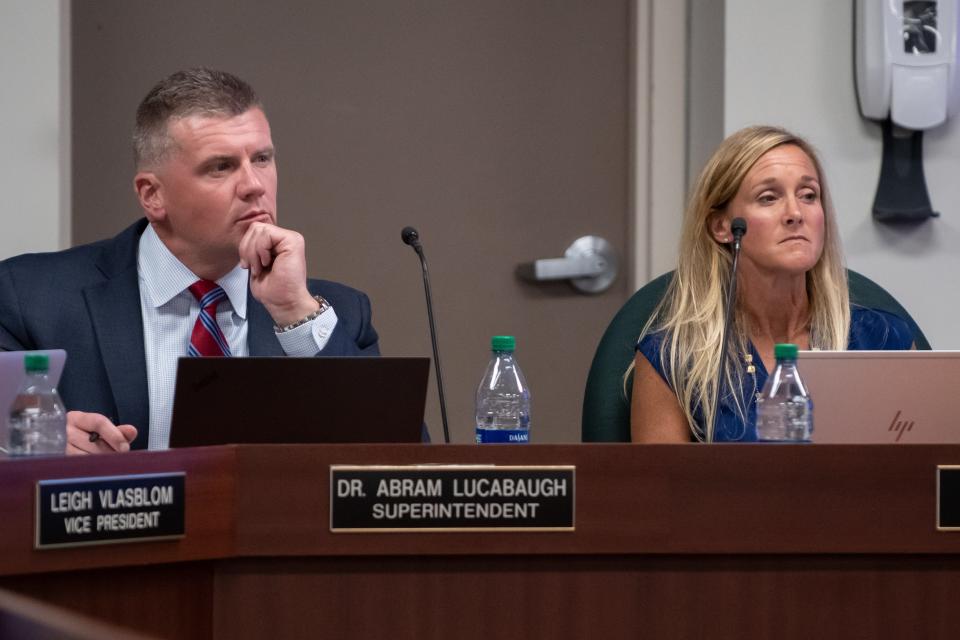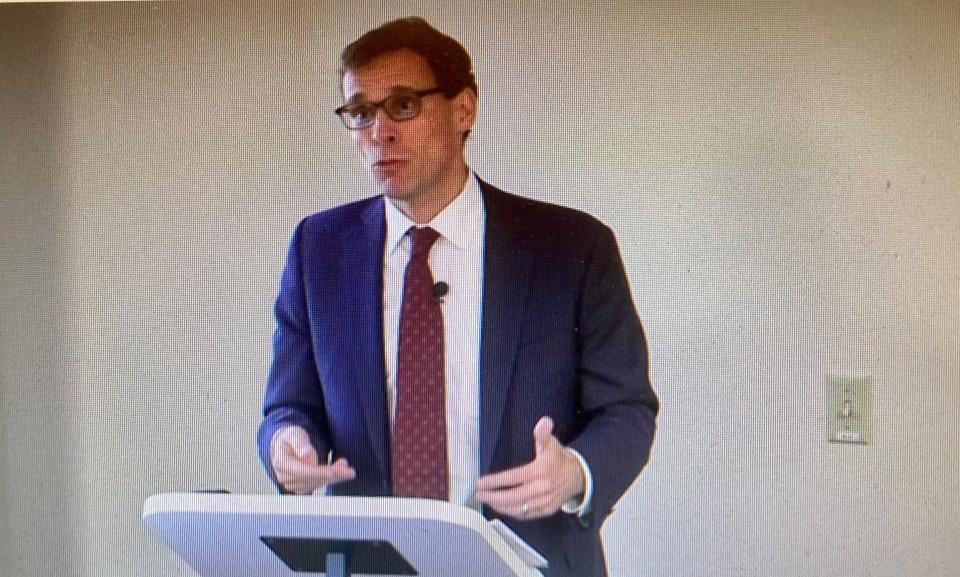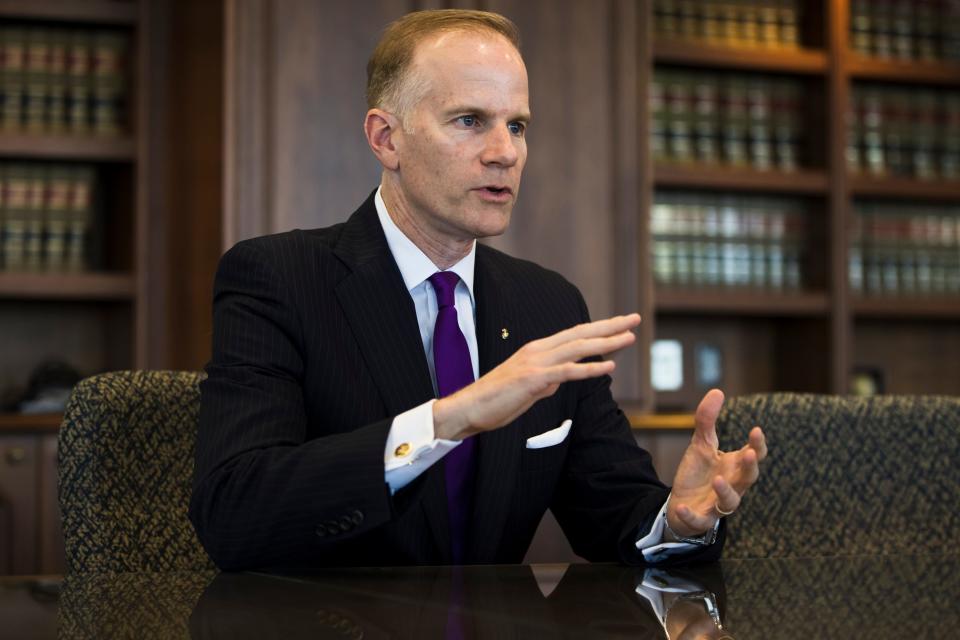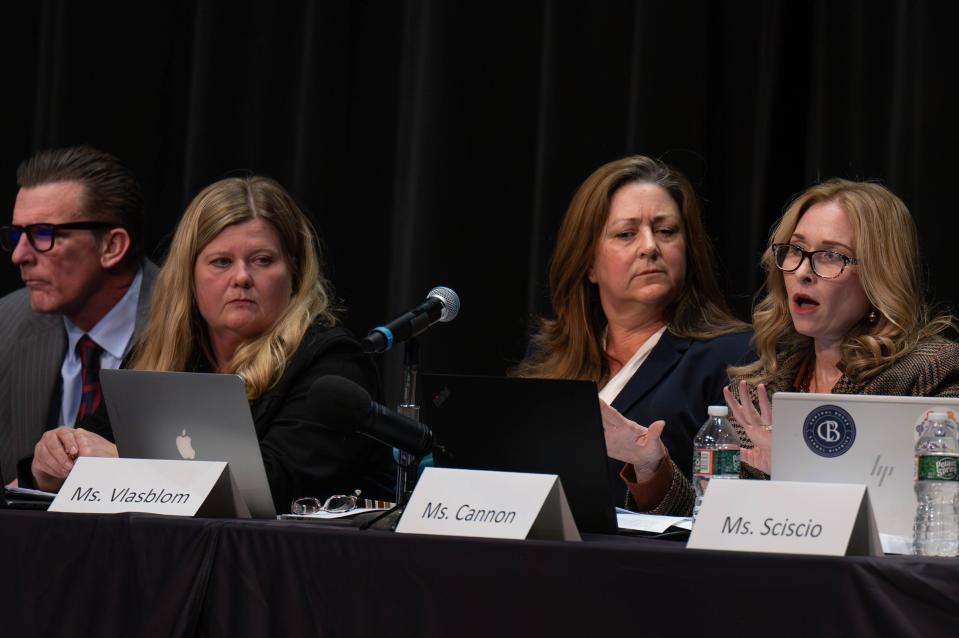Early review flagged $1.75M legal bills as 'seriously inflated.' Here is the reason why
Two Central Bucks School District officials were told months before final bills were submitted that legal fees for an investigation into alleged anti-LGBTQ discrimination claims appeared to be “seriously inflated,” according to a document obtained through Right to Know and the district solicitor.
Former Superintendent Abram Lucabaugh and former Board President Dana Hunter, were also advised in a June 2023 email to seek a reduction in the charges, which eventually topped $1.75 million, and request the firm submit documentation showing the work performed.

More Central Bucks School news Central Bucks hires attorneys McSwain, Rinaldi to investigate anti-LGBTQ claims in ACLU complaint
“One could spend countless hours picking apart this bill,’ Montgomery County attorney Edward Diasio, of the firm Wisler Pearlstine, wrote in the email. The firm has previously worked as special counsel for the district. “The bottom line is, from my standpoint, that it is seriously inflated and should be reduced considerably.”
The existence of a June legal review of the Duane Morris LLP bills was not publicly disclosed until December 2023 when the Democratic-led board was seated and confronted with the last series of bills to be paid. The board immediately authorized its solicitor to scrutinize the past billing.
In an email, Duane Morris spokeswoman Jennifer Barton declined to comment stating that the firm “does not comment on billing or personnel matters.” Neither William McSwain or Michael Rinaldi, the two senior Duane Morris attorneys who led the investigation responded to emails requesting comment.
At this point it is unknown who authorized the outside legal review or its cost. A Right to Know request for records of any payment for the legal review is pending.
The two current and one former Democrat board members have confirmed they we’re not told there was a review of the bills. The two former and one current GOP members did not provide answers.
It is also unknown if the district implemented recommendations with later bills or if Duane Morris reduced the amount. The district's liability insurance covered only $250,000 because Duane Morris was not an approved panel counsel for the insurer, leaving the district to pay the rest.
Here is what Diasio told Lucabaugh and Hunter that he learned from bills submitted for November 2022 through March 31, 2023, which, at the time, totaled a little more than $1.2 million.

Duane Morris didn’t follow through with its promised legal services strategy
In its agreement, Duane Morris indicated that two senior attorneys, former U.S. prosecutors McSwain and Rinaldi, would lead the investigation into four complaints filed with the U.S. Department of Education's Office of Civil Rights, and they would rely on assistance “where appropriate” from associates and legal assistants.
The strategy was good in theory, and the district could have benefitted from lower-cost attorneys and staff taking on less critical and technical tasks, Diasio said in his review.
“In other words, McSwain and Rinaldi should have relied on others to do the more junior tasks that they otherwise would have billed for themselves,” Diasio wrote.
But Duane Morris “poorly implemented” the promised strategy, which drove up costs.
The firm’s letter of engagement also gave the district 45 days after bills were submitted before they were due to allow for review of charges; the letter also indicated that the firm billed on a monthly basis.
But according to the district's business office, it received bills only three times between November 2022 and Oct. 31, 2023, despite repeated requests and attempts to get more regular submissions.

'Way too many attorneys' equals excessive costs, duplication
Besides McSwain and Rinaldi, the firm brought in an “army of attorneys” and the district paid for “all of their combined time to work on the matter together," something the letter of engagement did not contemplate, Diasio wrote.
As a result, any efficiencies that could have been achieved with the use of less expensive attorneys were “dramatically outweighed by the inefficiencies associated with managing such a large team.”
Diasio described finding what he called a dramatic amount of time — "probably several hundred thousand dollars" — spent on internal communications between attorneys, additional costs directly the result of the firm bringing in more attorneys, which introduced the need for more people to communicate with each other, he said.
“Again, the introduction of associates and legal assistants was intended to contain costs, not drive them higher,” Diasio added.
Billing shows 'absolutely staggering' amount of time reviewing documents, preparing investigation
Diasio also questioned what he considered to be extensive document production to the Office of Civil Rights.
“The amount of time spent reviewing documents to produce, and producing records to OCR is absolutely staggering,” he wrote. “I actually cannot fathom a scenario where so many documents were produced or produced in a way that took even a fraction of the amount of time billed.”
The firm attorneys also billed for a “significant” amount of time for preparing the investigation report in February and March, Diasio found.
“Frankly, there shouldn’t be much more time for any report drafting,” he said. “By the end of the investigation, given all of this prior time that was expended, the report should have been able to be fairly quickly compiled.”
The “significant (extremely)” amount of work on the review and revision of District Policy 321, which barred teacher discussions and classroom displays considered partisan, also caught Diasio’s attention.
“Policy 321 is literally a 1.5 page document. It can be read and understood in a few minutes,” he said.

'Excessive' use of attorneys who performed the same tasks
A December 2022 meeting in district offices with Lucabaugh, Hunter and former Board Vice President Leigh Vlasblom was attended by McSwain, Rinaldi and an associate attorney. Three attorneys at one meeting was not unusual, Diasio found.
Sometimes as many as four attorneys attended interviews and client meetings, where no more than one senior and one associate attorney were needed, Diasio wrote.
Diasio found dozens of time entries in November and December 2022 for as many as five attorneys that referenced the policy and more generally “policy review.”
“This is excessive and likely duplicative,” Diasio said. “I recognize that ‘Policy’ work is not something that Duane Morris perhaps specializes in, but no more than a handful of hours are likely warranted here.”
Also in the December bill review he found time entries for five attorneys who all cited preparation time for interviews involving staff at Lenape and Unami middle schools, a number he described as “extreme.”
In another entry, a senior and junior attorney billed a combined 24 hours to prepare a memorandum of the interview conducted with Lenape Middle School Principal Geanine Saullo, Diasio said.
“The time for this task seems wildly excessive,” he added.
In February and March 2023 bills he found “hundreds” of hours were billed for preparing the investigation report, an amount of time he felt was “extremely excessive.”

How CBSD will choose new members Central Bucks School Board will hold open interview process to replace two board members
What did the attorneys do exactly? Report cites vague time entries throughout bills
In January 2023, an associate attorney billed the district for 29 hours to “review documents.”
The time entries for the attorney did not provide any additional detail, according to Diasio.
It was possible the document review was connected to later scheduled interviews, Diasio wrote, but the entries made it “very difficult” for the district to determine what work was done and assess if it was performed satisfactorily before payment was due.
“Depending on the outcome of your next meeting with McSwain, if there is not a willingness to make a serious concession on his bills, it may be worthwhile for the district to start asking for copies of some of the underlying documents that were prepared,” Diasio wrote.
It is unknown if the district followed Diasio’s advice.
As an example, Diasio suggested the district ask for the memorandum summary of the interview of the Lenape principal. The district could ask questions to substantiate the work the attorneys performed, he said.
Diasio also offered to identify a list of “vague” entries and request more specific information about the tasks performed.
“You are entitled to this information, and are simply performing your due diligence duties before expending large sums of taxpayer dollars,” Diasio wrote.
Diasio also pointed to Board Policy 616 - Payment of Bills, which states its the responsibility of the chief operating officer or designee upon receiving an invoice to verify that the services were satisfactorily rendered.
“The process we are going through with this bill is exactly what your policy requires to ensure that the services you are paying for were satisfactorily rendered and until you are so satisfied, payment is premature.”
This article originally appeared on Bucks County Courier Times: CBSD review of legal bills in LGBTQ probe alleges over billing
Solve the daily Crossword

